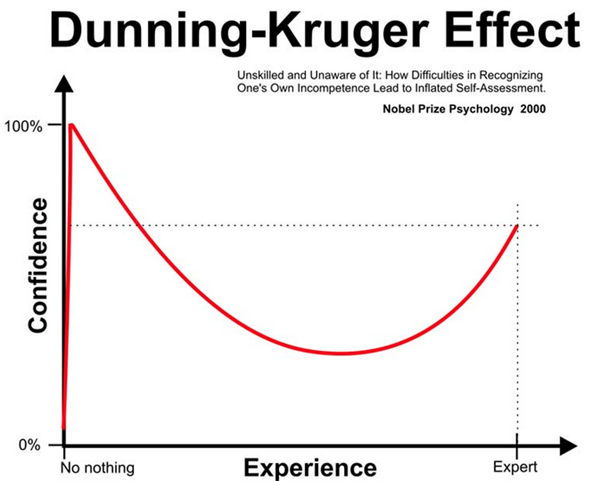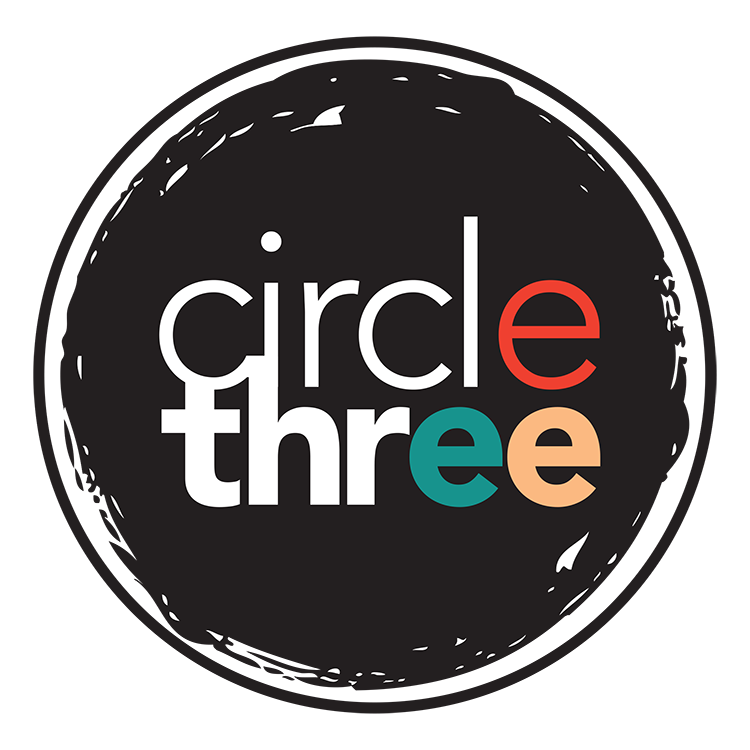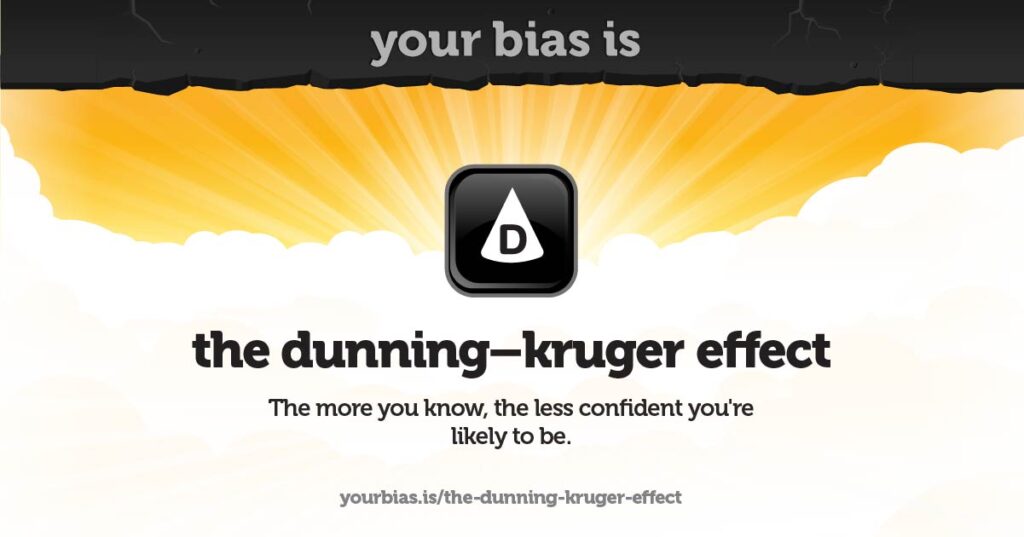This is one part in a series on Cognitive Biases and Logical Fallacies in marketing. Read more here.
The Dunning-Kruger Effect is a cognitive bias where individuals with low ability in a particular area tend to overestimate their competence. This bias arises due to a lack of metacognitive skills, meaning people aren’t able to accurately assess their own proficiency.
Here’s how it plays out:
- Ignorance of Ignorance: People with limited knowledge or skills in a domain often fail to recognize their deficiencies. They might believe they know more than they actually do because they lack the expertise to evaluate their own competence.
- Overestimation of Ability: This leads them to overestimate their capabilities and believe they’re more skilled or knowledgeable than they truly are. Their confidence can be significantly higher than their actual competence.
- Realization with Increased Competence: As individuals gain more experience or knowledge, they often start to recognize their previous overestimations. This is when they begin to better gauge their abilities and comprehend the complexities of the subject matter.
The effect is named after psychologists David Dunning and Justin Kruger, who conducted studies that demonstrated this phenomenon. They found that individuals at the lower end of a skill set tend to have an inflated sense of their own abilities compared to those who are more skilled, who often underestimate their relative competence.
It’s important because it can lead to problems like unwarranted confidence, making poor decisions due to lack of expertise, or an inability to recognize and learn from mistakes. Recognizing this bias is crucial in fostering a more accurate understanding of one’s own abilities and areas for improvement.

The Dunning-Kruger Effect in Business
The Dunning-Kruger Effect can significantly impact business decisions and marketing strategies in various ways:
- Overconfidence in Decision Making: Individuals with limited expertise may exhibit overconfidence in their business decisions. They might not fully grasp the complexity of certain situations, leading them to make decisions that are not well-informed or based on inaccurate assumptions.
- Risk-Taking Behavior: Overestimating one’s competence can lead to higher risk-taking behavior in business. This can manifest as overly ambitious projects, aggressive marketing strategies, or investments in unproven initiatives without fully understanding the potential consequences.
- Misguided Marketing Strategies: In the realm of marketing, individuals affected by the Dunning-Kruger Effect might believe they understand their target audience perfectly or assume they know what will work best in a campaign without conducting thorough research. This can result in ineffective messaging, targeting the wrong audience, or choosing inappropriate channels for communication.
- Resistance to Feedback: Those influenced by this bias might be less open to feedback or advice from experts. They might dismiss valuable insights from those with more experience, assuming they already know enough.
- Poor Communication and Collaboration: Overconfidence can hinder effective communication and collaboration within a team. Individuals might not seek input or consider alternative viewpoints, leading to missed opportunities or flawed strategies.
Addressing the impact of the Dunning-Kruger Effect in business and marketing involves encouraging a culture of humility, continuous learning, and fact-based decision-making. It’s crucial to emphasize the importance of seeking expertise, conducting thorough research, embracing feedback, and being open to adjusting strategies based on evidence and data. This can help mitigate the negative effects of overestimating one’s abilities and lead to more effective business decisions and marketing campaigns.
Let’s Fix It
To mitigate the Dunning-Kruger Effect among their audience when marketing waste, recycling, and sustainability services, companies can employ various strategies aimed at promoting informed decision-making and fostering accurate understanding:
- Educational Content: Develop informative and educational content that explains waste management processes, the importance of recycling, and the company’s sustainability initiatives. This content should be easily accessible and understandable for the target audience.
- Transparency and Authenticity: Communicate transparently about the company’s sustainability practices, achievements, and challenges. Avoid making exaggerated or unsubstantiated claims that could lead to misunderstandings or skepticism.
- Case Studies and Testimonials: Share real-life case studies, success stories, and testimonials from customers or partners who have experienced the company’s sustainable practices. This social proof can reinforce the authenticity of the company’s efforts.
- Clear Messaging: Use clear and concise messaging to highlight the tangible benefits of waste management and recycling services. Focus on practical outcomes, such as reduced environmental impact, cost savings, or community benefits.
- Engagement and Interaction: Encourage engagement with the audience through interactive campaigns, Q&A sessions, webinars, or social media discussions. This creates opportunities for people to ask questions and gain a deeper understanding of the company’s sustainability practices.
- Collaboration with Experts or NGOs: Partner with reputable environmental organizations, experts, or NGOs in the field of sustainability. Collaborative efforts can add credibility and authority to the company’s messaging.
- Visual Demonstrations: Use visuals, infographics, or videos to illustrate the company’s waste management processes, recycling procedures, and the impact of sustainable practices. Visual aids can enhance comprehension and retention of information.
- Empowerment and Calls to Action: Empower the audience by providing actionable steps they can take to contribute to sustainability. Encourage participation in recycling programs or offer tips on reducing waste at home or in the workplace.
- Consistent Communication: Maintain consistent and ongoing communication about the company’s sustainability initiatives. Regular updates and progress reports can reinforce the company’s commitment to long-term sustainability goals.
By implementing these strategies, companies can help their audience overcome misconceptions or overestimations regarding waste, recycling, and sustainability. This approach fosters a more informed and discerning audience that can appreciate and support genuine efforts toward environmental conservation.
Interested in Learning More?
We’ll cover more cognitive biases and logical fallacies in upcoming blog posts, but if you’re eager to learn more and access free resources, check out School of Thought. If you’re interested in see how Circle Three Branding applies these to your marketing strategy, contact us.

